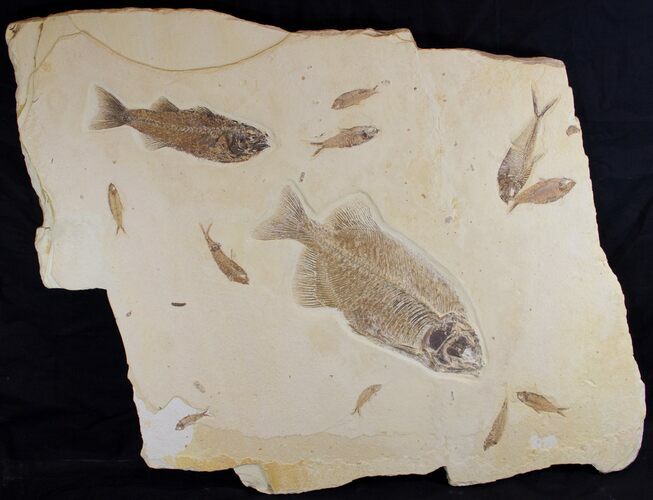This Specimen has been sold.
36x26" Fossil Fish Aquarium - Ready to Hang
There are 12 nicely detailed fossils contained on this plate. They consist of a 15.5" long Phareodus testis, a 10" long Mioplosus labracoides, a 6.75" Diplomystus dentatus, and 9 Knightia eocaena fish that are all approximately 4" long.
The piece is made from a composite of slabs from the Eocene aged, Green River Formation of Wyoming. All of the fish are authentic fossils and they have been pieced together and joined to create a beautiful showpiece. The piece is approximately 36" wide and 29" tall and it has been backed with wood to strengthen the stone and is roughly 1.75" thick. If you would like us to mount a hanging bracket on the back please let us know.
Both Mioplosus and Phareodus are two of the more uncommon fossil fish found in the Green River Formation. If you look closely you can see how Phareodus has a mouthful of sharp pointy teeth making is a voracious lake predator. In fact the name Phareodus actually means "to have tooth" Spines from other fish such as Mioplosus and Priscacara have frequently been found preserved in it's stomach. In fact the name Phareodus actually means "to have tooth" Spines from other fish such as Mioplosus and Priscacara have frequently been found preserved in it's stomach.
The piece is made from a composite of slabs from the Eocene aged, Green River Formation of Wyoming. All of the fish are authentic fossils and they have been pieced together and joined to create a beautiful showpiece. The piece is approximately 36" wide and 29" tall and it has been backed with wood to strengthen the stone and is roughly 1.75" thick. If you would like us to mount a hanging bracket on the back please let us know.
Both Mioplosus and Phareodus are two of the more uncommon fossil fish found in the Green River Formation. If you look closely you can see how Phareodus has a mouthful of sharp pointy teeth making is a voracious lake predator. In fact the name Phareodus actually means "to have tooth" Spines from other fish such as Mioplosus and Priscacara have frequently been found preserved in it's stomach. In fact the name Phareodus actually means "to have tooth" Spines from other fish such as Mioplosus and Priscacara have frequently been found preserved in it's stomach.
SPECIES
Phareodus testis, Mioplosus labracoides, Diplomystus dentatus, Knightia eocaena
LOCATION
Kemmerer, WY
FORMATION
Green River Formation
SIZE
15.5", 10", 6.75 Long on 36x29" matrix
CATEGORY
SUB CATEGORY
ITEM
#18030
We guarantee the authenticity of all of our specimens.
 Reviews
Reviews





















